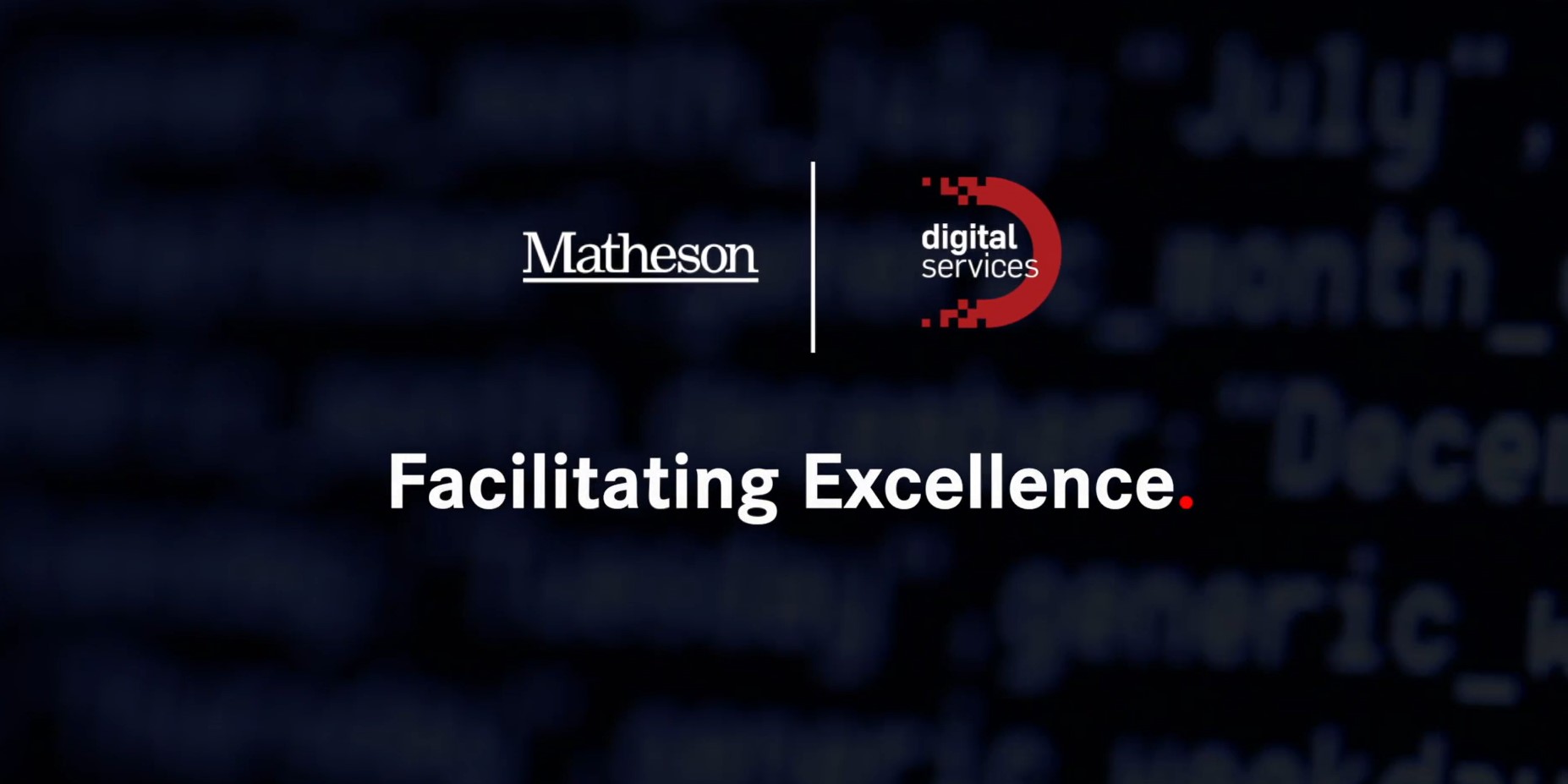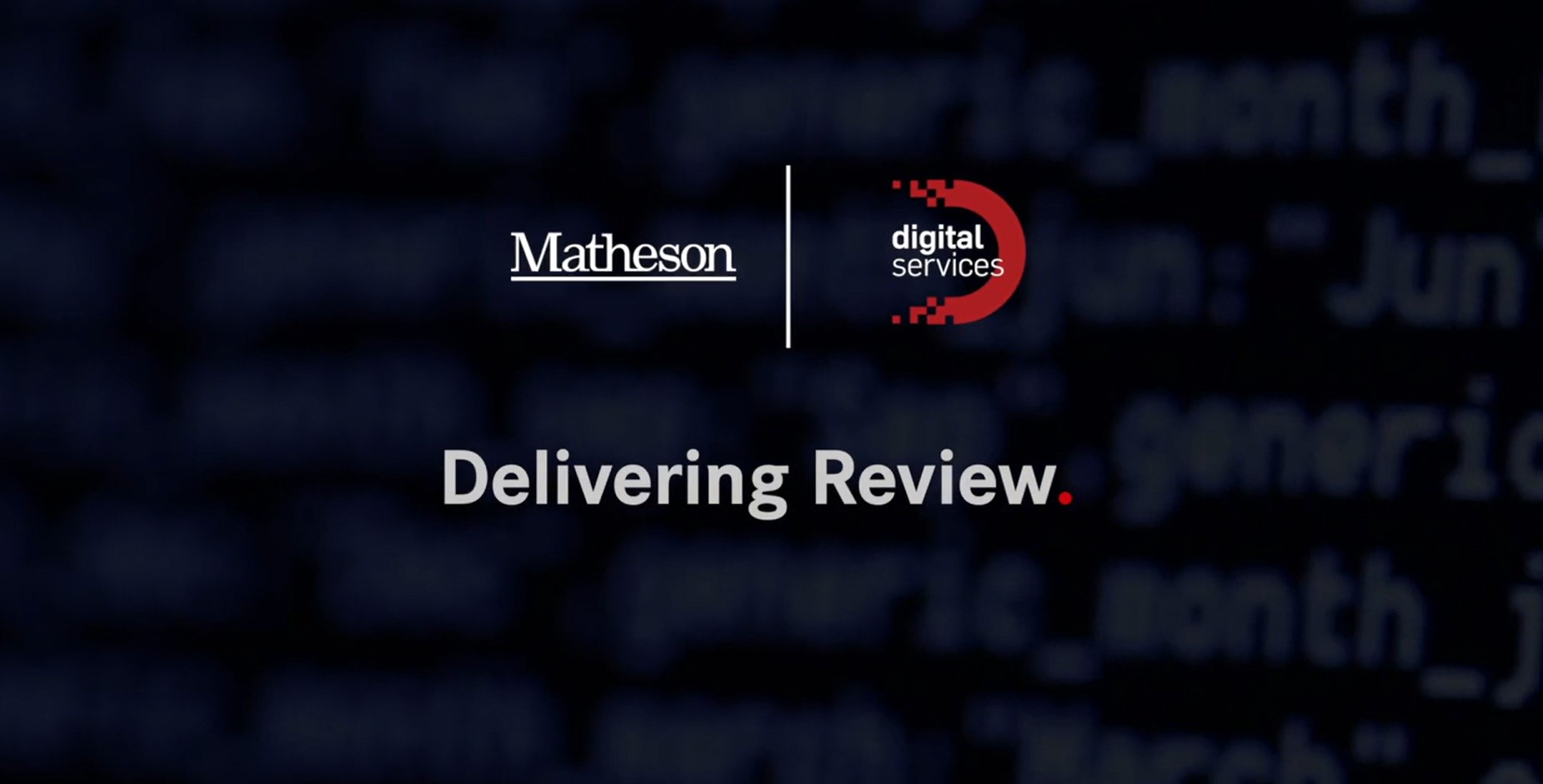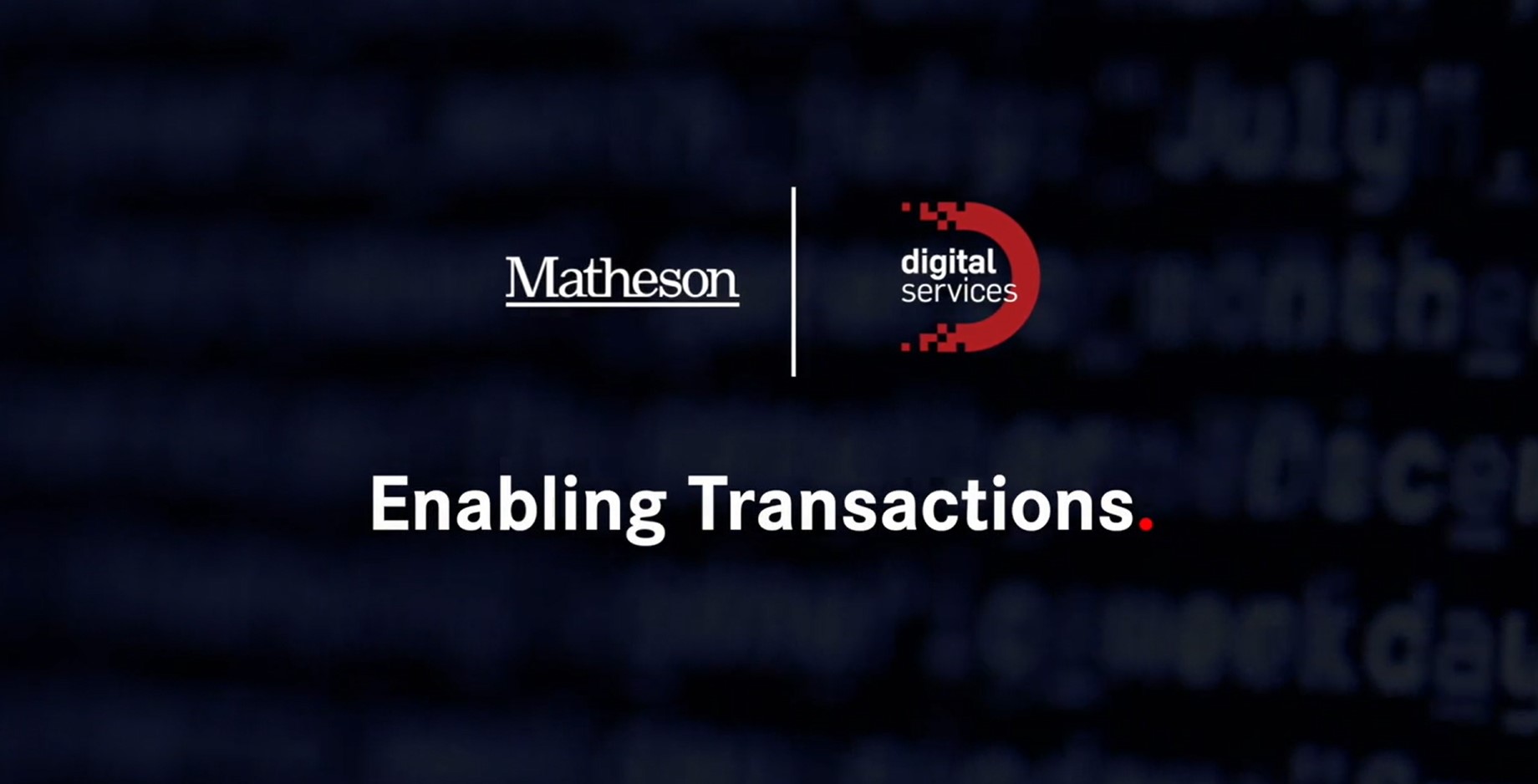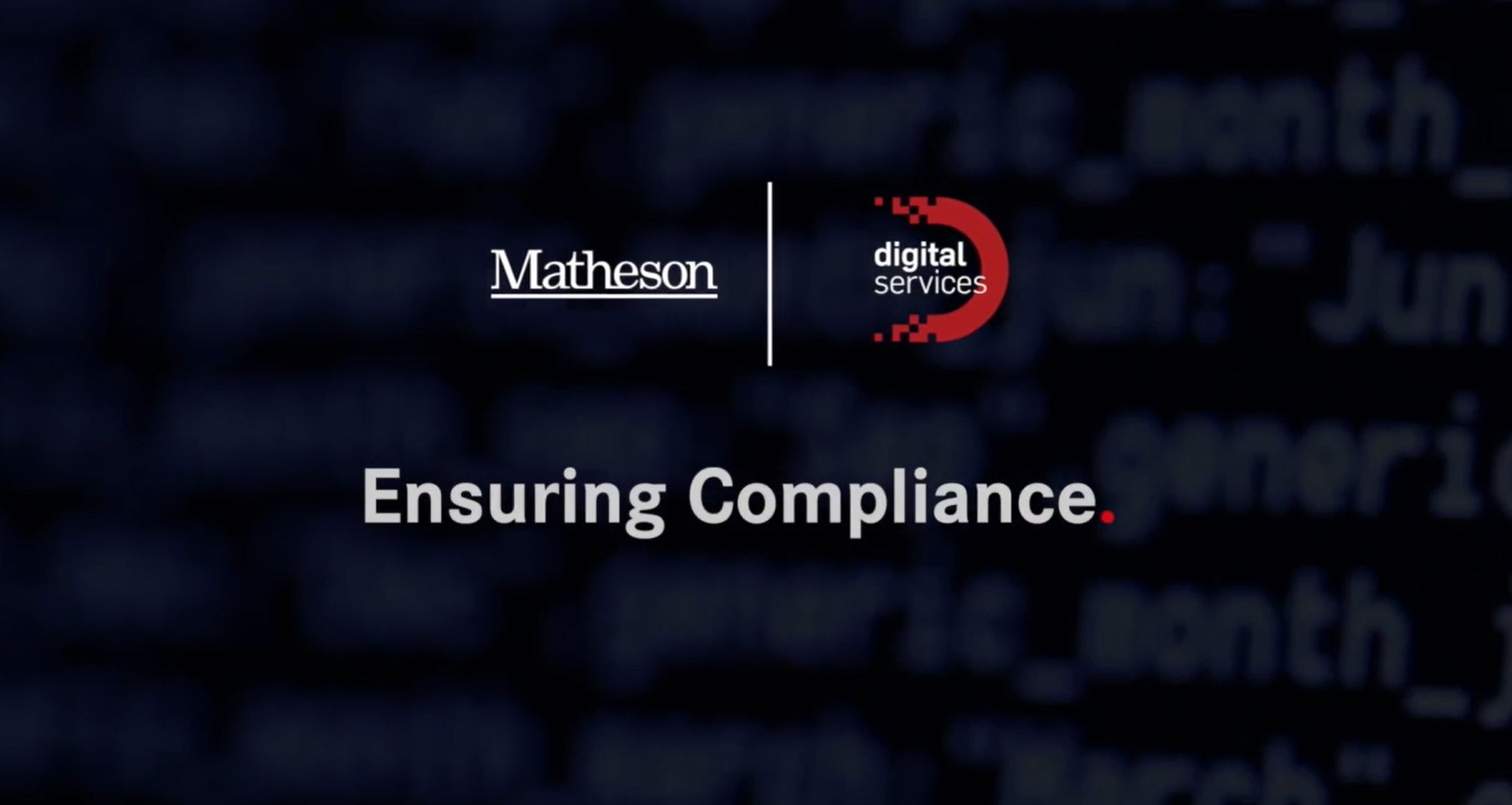
Delivering ReviewMatheson's Digital Services
The power of people, process and technology.
Whether for discovery, in response to a statutory obligation, or for the purposes of an internal review, the need to examine large amounts of data effectively to deliver on document review projects for clients has never been greater.
Our experienced Client Solutions team use best-in-class technologies alongside tried-and-tested review methodologies to ensure that our clients enjoy the benefit of well-organised, AI-enabled document review across a wide range of potential project types.
Finding the right method

Delivering Review Case Studies
E-Discovery
Read More
E-Discovery
Secure, fast, defensible eDiscovery.
The use of technology, more specifically the power of computing, to assist with the review of Electronically Stored Information (“ESI”) has been one of the original driving force behind the development of legal technologies for the best part of two decades. It has represented one of the earliest common uses of Artificial Intelligence within a typical workflow at law firms across the world. The common usage of Technology Assisted Review, (“TAR”), is something that has been developing alongside the technologies that have been able to drive it for many years.
We aim to provide outstanding results for our clients using a combination of expertise alongside technologies such as powerful data processing, Continuous Active Learning (“CAL”) and automated processes.
Case Study: The Client Solutions team within Digital Services Group, comprising of a Senior Legal Project Manager, eDiscovery Technical Manager, Legal Project Manager and Legal Technology Specialist, worked alongside the project team of Matheson lawyers working on this project. Together they scoped out the necessary technology and individuals with the right expertise for the successful completion of a review within the timeframe required.
Incorporating AI-assisted document analysis, a project management module, a dashboard featuring visualisation of key review metrics and automated report generation. Additionally, the client required two specific types of review to be carried out over discrete sets of documents. The platform was therefore configured to provide specific metrics in respect of each of these reviews; allowing those managing the project to have up-to-the-minute insight into overall review progress and material issues as they arose.
After initial processing and de-NISTing, it was decided that the best course of action would be to use Continuous Active Learning (“CAL”) to assist with the review of the documents. We put together an initial set of 500 documents for senior lawyers in the team to review. Based on the Relevance/Non-Relevance of the initial 500 documents, the system then assigned a score of between 1-100 to all of the remaining unreviewed documents in the review.
The system then automatically assigned to the main Review team only those documents that scored above 75 in that assessment, beginning with those that scored 100 and working downwards.
As the review team continued to code documents, the system was constantly re-rating the unreviewed documents and updating their scores.
Eventually, the reviewers started to notice that there were more and more non-relevant documents in their review batches. At the stage where batches were containing non-relevant documents the team ran an Elusion Test to ensure that there were no highly relevant documents remaining within the lower-ranked set.
Thanks to the use of CAL, we were able to complete the review having reviewed only 30,000 of the 250,000 documents, resulting in a significant saving of time and money for our client.
In addition to the CAL process, our team also used a three-tier QC process, automated redactions and automated daily metrics reports shared with the project team in order to ensure that the review was carried out defensibly, efficiently and at the best value point for the client.

Regulatory Investigations
Read More
Regulatory Investigations
Regulatory Investigations can often come without warning and with a stringent list of technical requirements alongside a tight deadline. Whether they arise as a result of a Dawn Raid, come via a formal request for information, or whether you wish to test your own compliance internally, the highest standard of investigation and response will always be required.
The Client Solutions team within the Digital Services Group at Matheson has the technology and the experience of working with our leading legal teams to provide fast, compliant responses to regulatory requests in a wide variety of situations. We utilise a range of technologies including Artificial Intelligence, process automation and our secure client portal offering to ensure that regulatory projects are delivered to specification, on time and with maximum client visibility.
Case Study: Matheson’s Client Solutions team worked directly with our regulatory experts to ensure that a multi-part Request for Information was delivered to the regulator’s required specification on time and within the planned budget.
Following a series of detailed requests for information from the Regulator, our client turned to Matheson to assist with the review of sensitive documentation for relevance and privilege.
Members of the Digital Services Group’s Client Solutions team, including a Senior Legal Project Manager, eDiscovery Technical Manager, Legal Technology Specialist and Legal Technology Consultant met with the various legal experts charged with the delivery to understand the scope and deadline for the matter and to form a project team for delivery of the requests.
The Legal Project Manager and eDiscovery Technical Manager put together a plan for the timely delivery of the project, including Key Performance Indicators designed to ensure:
- Things were moving at the pace that they needed to be
- Sufficient consideration was given to quality control review by senior lawyers
- Legal technology was used optimally in order to ensure a successful outcome
Additionally, the Legal Technology Consultant worked to create a Matheson Collaborate site that could be used to provide the client with an up-to-the-minute view of progress using both a custom designed project dashboard and task manager.
The multi-disciplinary Matheson team worked directly with the client’s in-house IT team to collect the relevant data in full accordance with the technical specifications set out by the Regulator, and to transfer it to Matheson.
Once in possession of the data, it was processed in order to obtain metadata in respect of each file and to enable powerful filters that our team were able to use to de-duplicate documents, filter out small irrelevant files such as logos from the bottom of emails, and arrange the remaining potentially relevant files into batches for review.
A review was then conducted on a three-tier basis, with automatic redaction and redaction QC applied to ensure that necessary redactions for issues such as privilege were made quickly and consistently across all of the documents. This also allowed our legal team to create a fully compliant privilege schedule as the review progressed.
When the review was completed it was checked against the technical specifications required by the regulator before being produced and securely transferred to them.

Data Subject Access Requests
Read More
Data Subject Access Requests
Matheson are leaders in the provision of legal advice regarding GDPR obligations, specifically in respect of responses to Data Subject Access Requests (“DSARs”).
Similarly, our Digital Services team are leaders in the provision of managed services to assist with the technical aspects of compliance with a request. We use our unique DSAR project management protocols, alongside leading data management technologies to deliver compliance with even the most challenging DSAR scenarios.
Case Study: A recent complex DSAR where the Digital Services team were able to utilise technology in order to ensure that a very tight deadline was met.
Given the potential fines that may accrue if Data Subject Access Requests are not responded to correctly and within the timeframe required, Matheson are often instructed to ensure that responses are defensible, in line with regulations, and delivered before the deadline.
In a recent matter we were instructed by a client in respect of a DSAR where, due to various factors, time had passed since the initial request had been received but no action had been taken. This effectively meant that the client had several days remaining to identify the potential personal information to which the data subject was entitled, to review and remove any third party personal data, or anything that was to be shielded from disclosure on the basis of any exemption.
- The first step was to locate the data associated with the data subject in order to try to find that which held their personal data. Our experienced team of technical experts worked directly with the client’s IT team to identify custodians of data and efficiently catalogue and extract data sources. We advised on legal tech solutions that used machine learning and AI to search through structured and unstructured data repositories and systems, including databases, email systems, and cloud storage platforms, to find all relevant personal data.
- Next, we minimised the timeline of the DSAR by applying search terms across the collated data. Working with our legal team, we reduced the timeline to ensure that responsive data that was relevant to the current DSAR.
- To further reduce the expensive and time-consuming legal review, an analytics platform was used to process and run analytics over the responsive data set. We then used analytical tools to identify duplicative documents by classifying and removing documents that were textually identical (or near identical).
- Additionally, we undertook an email threading exercise which gathered all forwards, replies and reply-all messages together. Email threading identified email relationships and condensed them into a single document. This greatly reduced the time and complexity of reviewing emails, and ensured consistency across the review.
The Digital Services and legal teams worked together to drive the review of those potentially relevant documents. Through the course of this project a specialised Senior Legal Project Manager ensured that the review proceeded on time and under budget.
Once the data had been reviewed and categorised, the Digital Services team applied automated redaction technology to efficiently redact third party personal data and other sensitive information. The response was then created, including a schedule of relevant documents, and made available to the Data Subject via a Secure File Transfer protocol.
Throughout the review, all actions and decisions were logged for compliance and auditing purposes. Every decision made on a the status of a responsive document is carefully recorded, from the type of privilege that attaches to a document to the level of commercial sensitivity that it attracted. This provided our client with a DSAR that was robust, secure and delivered on time.
Matheson offer bespoke solutions to DSARs whereby multiple tiers of review can be done to ensure that data provided is accurate while taking into account the sensitive nature of your organisation’s data. Our team can offer greater or lesser tiers of review, balancing costs and time against your organisation’s appetite for risk or the sensitivity of the data set.

Contract Analysis
Read More
Contract Analysis
Lawyers at Matheson have been using the power of Artificial Intelligence to improve our workflows for several years.
One of the most potent use cases has been the provision of Machine Learning technology to provide for advanced interrogation of the contents of contractual documents. Our technology can quickly access the type of documents, provisions contained within the documents and even answer questions about the documents in any document set within a matter of minutes.
Case Study: Discover how our AI-enabled document analysis platform enabled our legal teams to quickly assess contractual obligations and advise our client accordingly.
Following a significant data breach, Matheson lawyers were approached by a client who required an analysis of their contractual obligations as quickly as possible. There was much to sort out, and it was imperative that both the client and their professional advisors, including Matheson lawyers, were able to move fast. The legal team identified the need to understand what obligations the client had to any third parties that they had been sharing data with. The client shared an initial set of 444 separate documents that required review.
- Following this meeting, The Digital Service Group were contacted immediately and were available to assist the legal team with this instruction. After being briefed on the document set that we would be receiving, we provided options for secure transfer methods and identified our AI contract review platform as the best solution. It was agreed with the lawyers what data points the AI would be asked to look for.
- Our Legal Solutions Consultants set up an initial workspace on our AI-based contract review platform and configured a system to provide specific analysis in respect of data breach provisions, general data protection provisions, limitations, warranties, and a range of other analysis points.
- Having organised the data and set up the AI-enabled analysis platform we imported the documents and instructed the system to analyse what had been uploaded. This initial set up and AI review phase was completed within around 30 minutes.
Once this second level of review had taken place the system automatically produced a report in respect of all documents. This report outlined the various clauses contained within each document and across the document set, allowing our lawyers to focus on those provisions that concerned obligations or duties in the event of a data breach, and to carry out a more detailed review of those specific documents that dealt with those issues. .
From the point at which the Client Solutions team received the documents until the output of the initial analysis was a time period of around 30 minutes. This allowed the Matheson lawyers to provide reliable initial advices to the client within a matter of hours from initial instruction.

Redaction Exercises
Read More
Redaction Exercises
A fast, secure and reliable redaction service.
Redactions can be required against a large number of documents of varying types for many different reasons. Our managed redaction service is designed to deliver redactions on a wide range of document types, utilising automatic redaction software and Matheson quality control processes to ensure that our clients receive the redacted documents quickly and with a full audit of all redactions made. We can quickly produce a schedule of documents that have had redactions applied and the reasons for those redactions. Individual redactions can also be labelled with the reason for the redaction directly.
Case Study: a recent bespoke redaction project that involved the fast and secure redaction of a number of terms across a large number of documents.
The Digital Services Group was engaged by a large multinational client who was required to share approximately 250 sensitive documents with another party. Prior to sharing these documents the client required certain information to be redacted. The Client Solutions team worked directly with the client to identify the most appropriate technology to carry out this redaction exercise, and identified a platform with an automated redaction solution as the most appropriate platform.
- The documents were then transferred to Matheson using our secure file transfer platform and we immediately arranged for the documents to be loaded into platform, processed and scanned using optical character recognition in order to ensure that they were searchable.
- A Legal Project Manager then liaised with the client to identify the specific redactions that were required for the project. Given that there was a requirement to redact both specific words and certain types of information, regular expression searches were also agreed.
- The regular expression searches were carried out and an additional list of terms for redaction was created. The platform then scanned the entirety of text across the document set and where the specified terms were identified redactions were automatically applied.
- A quality check was carried out to ensure that all documents containing the specified terms had been redacted.
- In addition to the automated redactions the documents were also reviewed in full to identify any other personal or sensitive data which had not previously been included in the list of terms to be automatically redacted.
- Where additional confidential information was found, redactions were applied manually by the reviewers. These were then subject to a sample-based quality control analysis by a senior member of the review team. The client was provided with a redacted copy of all documents with the redactions in a semi-transparent format, allowing them to carry out a final review and approval of proposed redactions.
Once the Quality Control process had been completed a ‘production’ was initiated which transposed all documents into fully redacted and sealed pdf versions. We then provided the client with a copy of all of the fully-redacted documents which they then transmitted to the third-party. The entire exercise was completed within three days.

Other ESI Review
Read More
Other ESI Review
There are many potential reasons for a review of Electronically Stored Information.
If you would like to know more about how we can manage your review in a fast and cost-effective way, please contact the Head of the Matheson Digital Services Group, Kyle Gribben or email digitalservicesgroup@matheson.com





Facilitating Excellence
Colleen Robinson, Senior Development & Automation Manager, and Ryan Kelly, Lead Software Developer, discuss our approach.
Delivering Review
Connor Cassidy, litigation partner, and Cliodna McAleer, Senior Legal Project Manager in the Digital Services Group, discuss the capabilities of our Client Solutions team.
Enabling Transactions
Corporate Solicitor Niamh Gallagher and Legal Solutions Consultant Darragh Moore discuss some of the ways in which the Digital Services Group put legal technology at the heart of our transactional work.
Ensuring Compliance
Senior Regulatory Advisor Bríd Cannon and Senior Legal Technologist Stephen Kelly discuss the solutions that we are providing for our clients.


